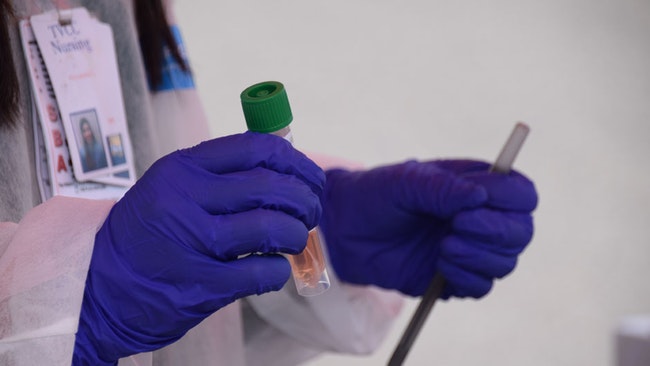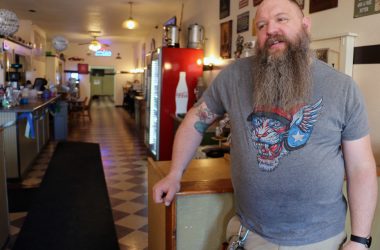
EDITOR’S NOTE: This story is published as part of “The Human Toll,” a statewide collaboration of news organizations sharing stories about the human impacts of the Covid pandemic. The Malheur Enterprise is part of the collaboration.
BEND – Jean Jones doesn’t even ask any more if her family members smell the same thing she does.
She knows now the problem is a lingering side effect of having COVID-19.
Bend resident Shira Franklin has a compromised immune system and lack of energy months after having COVID-19. She’s been like this since July and still fears getting the virus again because her doctor has said the immunity will only last a couple of weeks.
And then there’s the social stigma of being a so-called long hauler. When each of the women told people they’d had COVID-19, they experienced people physically taking a step back from them.
For the thousands who have voiced their concerns on Facebook groups and other social media platforms as long-haul survivors of the virus, COVID-19 is like a guest that stays too long.
The Centers for Disease Control and Prevention admits that little is known about the long term effects of COVID-19. The CDC states that most people recover fully and some have lingering symptoms that last for weeks or months. Even people who are never sick enough to be hospitalized can experience lingering side effects, according to the CDC.
Jones, 64, first came down with symptoms on Nov. 3. A member of the Central Oregon Mask Makers group, she and her mother helped make thousands of fabric masks that were given away to St. Charles Health System’s medical professionals, members of the Confederated Tribes of Warm Springs and anyone else who wanted one.
And even though she intellectually understood about the virus, she wasn’t convinced that it was truly as bad as medical professionals made it out to be.
“I had been on the fence about the COVID,” said Jones from her home in Madras. “I knew it was bad, but I didn’t know if it was really all that bad.
“It’s definitely real now.”
While she talked about how she felt at first, she said the dates run into each other. Her symptoms began with an annoying cough, which she at first thought were allergies. Then the fatigue set in.
Her eyes felt like thousands of needles were poking her. She slept for 18 hours straight. Then came the fever.
Everything was an effort. Going to the bathroom. Walking and standing up.
“Everything runs together,” Jones said. “It all runs together and I have no concept of time. No taste. Now smell. Congestion. I thought it was the flu. “
She finally called her doctor who told her to come by for a drive-through test. When the medical practitioner came out to her car dressed in full personal protective equipment, she got worried, but still didn’t think she had COVID-19.
Two days later, she got confirmation. COVID-19.
The worst part of the entire ordeal was that she infected her 96-year-old mother, granddaughter and granddaughter’s boyfriend, Jones said.
“You feel like a piece of dog biscuit,” she said. “I feel guilty that everyone got it. I don’t know who brought it in.”
Her mom spent a week in the hospital and has recovered. Her granddaughter didn’t have any symptoms and her boyfriend lost his sense of taste and had a fever for a day, Jones said.
Of the three who were sick, Jones is the only one with lingering side effects. It’s been more than a month and she smells things that no one else does and is still fatigued easily. A trip to the store requires a nap. Sometimes making dinner is an effort.
“We really need to take this seriously,” said Jones.
The World Health Organization estimates that people typically recover in two to six weeks from COVID, but some people may have lingering symptoms following an initial recovery, the WHO states.
For Franklin, who worked in a small restaurant in Redmond, she got sick back in July. While she is recovered, she still doesn’t feel like herself pre-COVID-19, she said.
“I don’t think any of us really do recover fully,” said Franklin, 36.
The journey from symptom to a positive test started with breathing difficulties, she said. At first the doctor thought she had bronchitis, but opted to test her for COVID-19 just in case. He sent her back to work because she didn’t have any COVID-19 symptoms, Franklin said.
“When I got the call that the test was positive, that I had COVID, I hung up and went to my manager and told him. He told me not to touch anything,” Franklin said. “I cried for an hour in my car, not because I had it, but I was fearful with my asthma, and I realized I had put my boss and my roommates at risk.”
No one else around Franklin ever got sick. That’s the oddest thing about COVID, it skips some and pummels others.
Franklin’s pretty sure she got it while working as a server at the restaurant. Dine-in customers were allowed to remove their masks while being seated at the table under the Oregon government mandates.
It’s months later, and Franklin still has trouble with her taste buds and sometimes her energy lags. “It will take months for her immune system to return to normal, she said. And she’s never going to be safe from COVID-19 until it’s tamped down.
“When people hear I had it, they step back and look at you and ask what did you do to get it,” Franklin said. “People have asked me if I was partying or not wearing a mask. Nope, I did everything I was supposed to do.
“I’ve never been so depressed. I felt so alone.”
ENTERPRISE HOLIDAY SPECIAL: Get a full year of access to the digital service of the Malheur Enterprise at a 25% savings. No news organization can match our quality and depth of coverage of Malheur County. This is a limited time offer you can get HERE.




